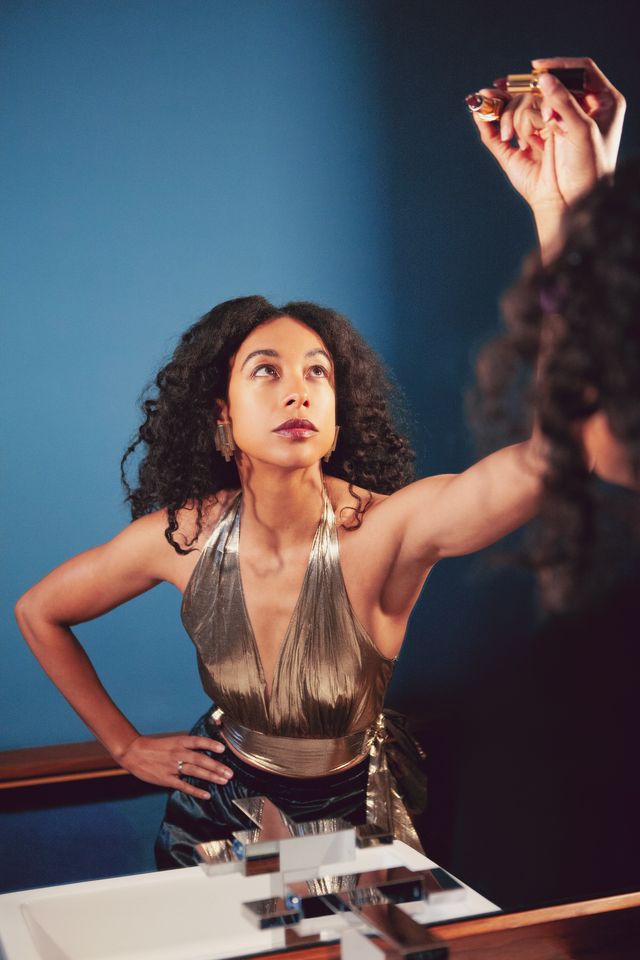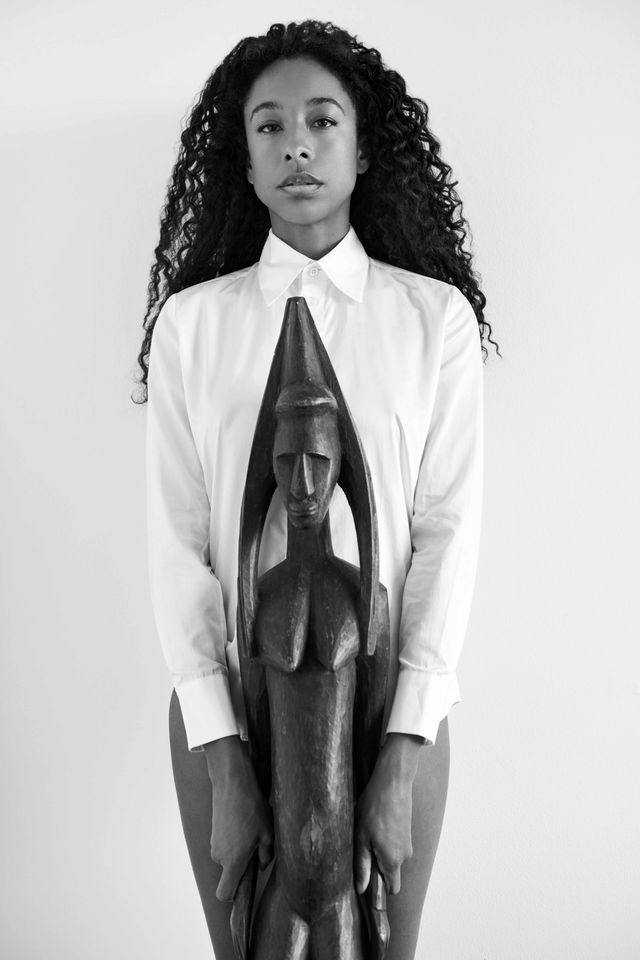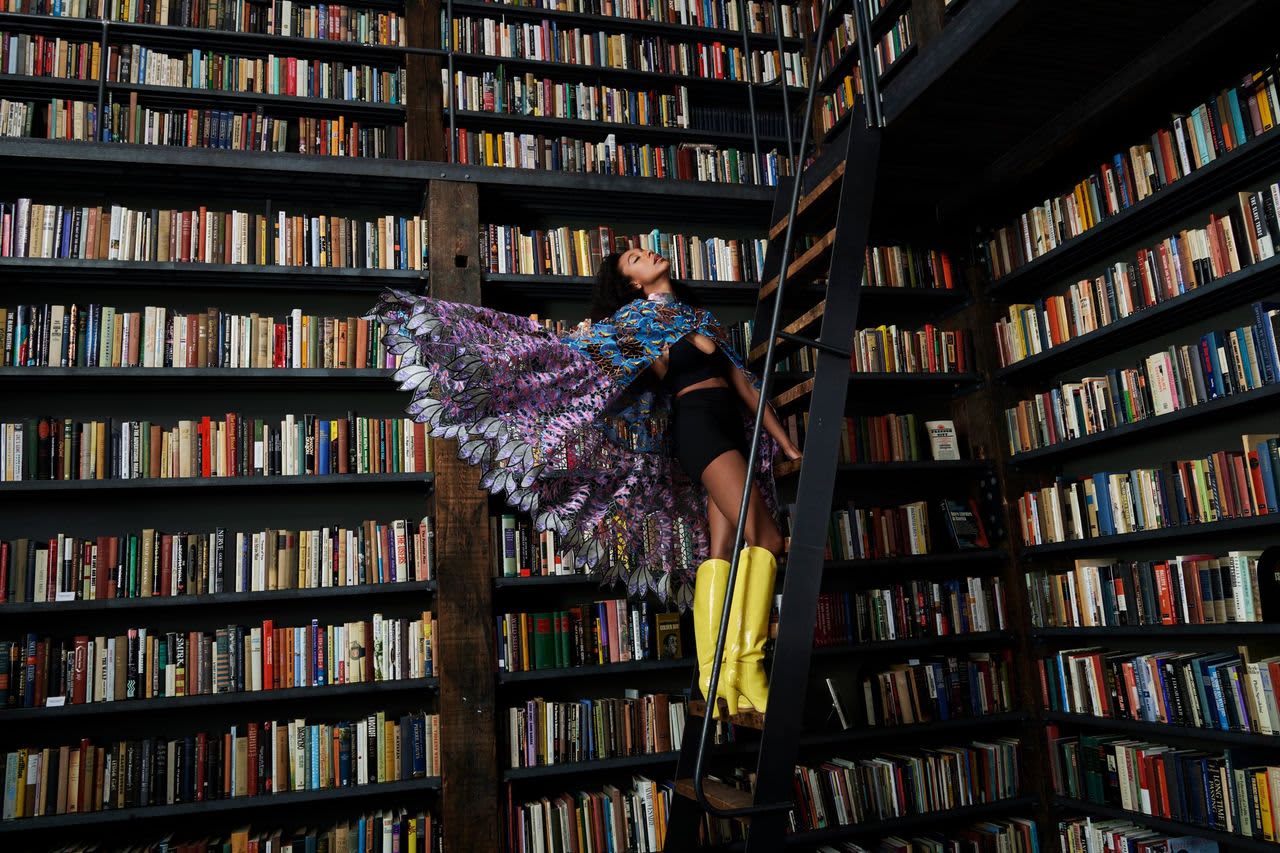Corinne Bailey Rae’s Put Your Records On snap-shotted the summer of 2006. Swooping through jazz, pop and indie – insanely and instantly catchy – it was an upbeat counterpoint to the sweetly soulful romance of Like a Star, both from her debut album. Her subsequent releases have charted her life exploring identity and loss with emotional complexity. Her most recent, Black Rainbows came out 2023 and it is obvious to hear how much she is relishing the full range of her unique voice and, as I was to discover when we spoke, her extraordinarily lyrical vocabulary.
Are you excited for your set at Wychwood?
I’m just so looking forward to the Wychwood show. We’re a festival band, we love playing to people who never seen us before or people who think they know what it’s going to be like – but they don’t. We love that thing where the tent gets busier and busier, so come down and check it out. We’re doing something exciting, it’s different every time.
What’s the set-list looking like?
I mean, we've been working on Black Rainbows, so we've been playing music from that record, but we're going to be playing a mixture. Old music, things that are familiar, and new stuff as well. I guess it’s going to be highlights from all four of my records. It really is a live show. We're not using play back so we're able to respond to the audience; we can make songs longer or shorter, stop or change. You know, we listen to what people shout out and we really like to be a dynamic band.

photo credit: Rebecca Hull
How you would describe your musical progression.
Black Rainbows is just a mixture of everything I’ve done so far. A lot of people have said it’s a different sound for me, but I think people who have known me a really long time would say, ‘oh I recognise you in this’. It is the broadest kind of music that I’ve made. Some of the songs come from my past; I was in this indie band called Helen when I was a teenager. Some of it is influenced by the jazz music and I’ve been really lucky to play on stages with some really great musicians: Herbie Hancock and Wayne Shorter, Stevie Wonder. All these moments really influenced me.
Do you agree with the suggestion that your music has gone from the personal to the political…
I’m a big believer in that statement ‘the personal is political’; I think it’s a really challenging phrase. I know when I first brought my first record out people would see it as more romantic – love songs. They wouldn’t necessarily see the context for it, which is just to be a Black, multi-ethnic person wearing a prom dress, or running through a field, or playing an acoustic guitar: the making of those images and being in those spaces was still quite an unusual thing to see.
When my record came out so much Black imagery was pigeon-holed as urban, so it would be, like, stand against this wall with loads of graffiti, or wear this sports brand, or look sort of tough. In that sense, even though the first record is a lot of romantic songs or songs about my childhood, it still has political work to do because to win the right to talk about your interiority as a young Black girl was a rarer thing.

Photo credit: Ulrike Rinderman
Do you feel that ‘work’ is closer to being done?
I do think there’s movement, I really see that with young people. So often young people aren't signalling I am male, or I am female and that does seem a lot freer. So many Black people – especially in music – did so much to push out the boundaries. Think of someone like Sun Ra who presented himself as a being from another planet to break away from what people might think the stereotypes are for how a Black jazz musician has to sound or play or talk.
Artists get all that freedom, like Bowie, they get the opportunity to turn everything inside out and to reinvent. I think a lot of Black artists like Earth Wind & Fire or Miles Davis or Aretha Franklin, they just presented themselves in this different way. Aretha's a torch singer but she's not at the piano and then she is at the piano, then she's in the gospel church then doing something with the Eurythmics. I feel like there’s a lot more space.
The video for He Will Follow You With His Eyes (on the new album) references 1950s US beauty brand Valmor, and its imagery which presents Black women’s beauty in a very white, idealised way. Do you feel this is also changing?
I love the illustrations on those Valmor tins by the Black artist Charles C Dawson. They were really progressive in showing Black beauty at that time. It wasn't like the negrobilia objects, you know? People with enormous lips or children with braids showing big bald patches; those anti-Black images. There’s a complexity of the feeling I have towards those images; they’re beautiful, he's a talented artist, and he's doing all this other work in wider culture, but at the same time the company is pushing ‘lighter, brighter, longer, straighter’ and all of those messages are still really powerful today.
In terms of beauty there’s a lot more diversity in terms of body size, body image, hair textures, skin colours and how we adorn ourselves. It seems to be a good moment in terms of beauty. I used to be a really big Vogue reader and they would say what the trends were, but I feel like nobody wants to make those kinds of statements anymore because they just don’t really work. Everything’s just fluid, and so much of fashion comes from the street.
I hear a synchronicity between He Follows Me With His Eyes and Put Your Records On and it feels a bit like you’re going full circle.
I think that’s brilliant, and I always love when people see that because this music is more outward facing and yes, there is that line in Put Your Records On: ‘gotta love that afro hairdo’…
…and that Bossa nova intro.
Yes, when I sit down and I’m writing with my guitar (I started Put Your Records On and He Will Follow You With His Eyes on guitar) Bossa nova really falls well under my fingers. I enjoy it but also I wanted to use that in a subversive way, so you’re kind of lured into this dream world where everything's perfect and all you have to do is make these augmentations to yourself and you can have whatever you want; help yourself to love and help yourself to happiness – that’s what the adverts would say.

I understand Black Rainbows was inspired by your time at Stony Island Arts Bank, the community-led arts and culture centre founded by the artist and professor Theaster Gates in the South Side of Chicago. It clearly had a profound effect on you, can you tell us what it revealed?
The thing that I loved about Stony Island Arts Bank is it reminded me of the places I’ve been before. Massive vast places with lofty columns or wood panelled university libraries; they have this hallowed thing. I remember being a student thinking there’s so much to learn; original copies of say, a Virginia Woolf work or a Dickens. I’ve been in loads of academic spaces before and been really excited by the nerdy things – the smell of the books and the leather bindings – and then of course, I’ve been in a lot of Black spaces that might be the place where you'd go and get your social security or a day care centre as well, or a place where you'd pick up your prescription. In that, maybe 70s or 80s building, there might be certain tatty shelves with maybe some Black literature. Stony Island Arts Bank is this grand, hallowed space with beautiful wooden shelves and ladders, so you can climb and climb and get to the books and when you get at the books they aren't Shakespeare and Dickens and George Eliot they’re Black writers. People that I don’t know of; fiction writers, people who wrote about the Black pioneers going west, a whole load about the rock churches in Ethiopia, biographies.
To me, the mind-blowing thing is I might have seen [some of these objects] dotted around, like on a pub wall in Robin Hoods Bay: cartoons of Black children – probably from the 1890s – and they look a bit grotesque but at the same time I’ve never seen a cartoon of Black children on a chocolate packet so I’m kind of drawn to it. Like, I’m 10 or 11, so I don’t really know about derogatory images but then to be in the Arts Bank and here's a Black curator who's collected it all to take it out of use, but at the same time, here it’s under his care and it changes the context entirely.
I read that you have said you allow your ‘scholarly interests to bleed into and inform your music’. Thinking about your background – classical violin, church choirs, English Degree at Leeds – where do you see the line between high culture and the popular culture in terms of how your persona as an artist is reflected.
I think it’s really important to be in both spaces. I love academics and the singular focus on study. On this tour I spoke at Yale, Spelman College and Columbia but I also really have a need and a desire to connect with people. In those talks I want to use certain language, but I also want to make sure that all different kinds of people get it, not just people who have done an MA in Ethnicity Studies or History of Art.
My touring company is called All Connected and connection is really important to me – I don’t want to just disappear and make sort of cerebral work that doesn’t get consumed; I want people to eat it up. I really want to be in front of an audience playing music. It is the great language that can be appreciated in so many different levels. Someone might be able to take apart the lyrics, but I really want people to just be able to feel. When I’m playing Put Your Records On and people’s faces light up, or there’s kids on the front row I think ‘you weren't even born when this song came out’, but maybe your parents have played it to you…that makes me so happy.
Corinne Bailey Rae will be performing at Wychwood Festival 31 May – 2 June at Cheltenham Racecourse. Tickets and more information can be found at wychwoodfestival.com









